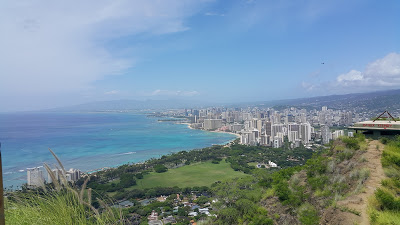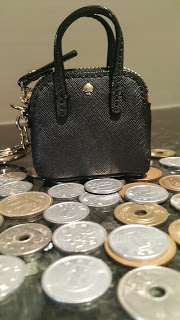For quite a few years in HK, I managed with only having a card holder and stopped using a purse/wallet. Since I generally have a preference for small handbags and I had a plus size phone for a while (I’d still use this in Japan too if my work hadn’t given me a smaller one), this was perfect as it could all fit neatly into the smallest of my small handbags, even with my headphones in their own little case and with my reusable shopping bag.
I like to have things neat and separate. It’s one of the reasons why I like handbags that have little compartments. It makes it easy to find everything.
I’d even downsized to only needing two keys to get into my place (most in HK require two to three keys and / or an access card) and had them on a flat keyring. Very handy for when I went running too as it could all fit into the tiny pocket in my running shorts along with my dog’s poo bags.
I lived a fairly cash free existence.
Between my Cathay Pacific American Express Credit Card (awesome since it rewarded Asia Miles at a ridiculous rate, even more so when I travelled, which I could then use for flight upgrades or redemptions for quite a few different things; always paid in full each month otherwise no benefits), my HSBC Visa (which wasn’t quite so awesome though still gave their own points, discounts at particular stores and could automatically pay from my account each month) and my Octopus card (also set to auto top-up), there wasn’t much need to carry cash.
I felt free.
I am no longer free.
Not am I now carrying cash, I can’t yet apply for a credit card as I haven’t been in Japan for long enough.
To add to this is the money itself.
Where HK money has always seemed like Monopoly money to me, Japanese money is like Monopoly money on steroids. The smallest HK note is a ten, the smallest Japanese one is a thousand.
The coins in HK range from 10 cents through to HKD10; notes are $10, $20, $50, $100, $500, $1,000. It’s not often that $1,000 is even seen and many stores don’t even accept it as they were counterfeited some time ago.
The Japanese coins are ¥1, ¥5, ¥10, ¥50, ¥100, ¥500; the Japanese notes are ¥1000, ¥2000, ¥5000, ¥10,000.
For the sake of a simple comparison, HKD100 is roughly the same as ¥1,400, AUD17 (it was AUD20 when I arrived in HK!), USD13, E11.40 and GBP9.
Consumption tax in Japan is a flat 8% across all items so the price rarely ends in a round number.
This adds up to a lot of change in my purse, which I’m now using again.
As a side note, what’s impressive is while I try to figure out the coins I have in my hand (I’m yet to work out which is which at a glance), shop assistants have been willing to help count out change from my hand. It’s not like they are trying to rush me either as there’s not always a queue behind so I”m taking this as a sign they are being genuinely helpful rather than trying to have me leave the store quickly. In a mix of the International Language of Charades, my limited Japanese and their English, we get it sorted out so I often leave with a note rather than more coins.
While Japan also has a couple of different smart cards, I am yet to work out how to have it automatically charge from my bank account (since my Japanese is still less than fluent) so I can use it for more things. Once I have this sorted out and an auto-paying credit card, I am hoping to go back to my fairly cashless existence.
I like the simplicity of it.
And using a smaller handbag.
* Thanks to Cyndi Lauper for the title to this post. If you have the opportunity to see Kinky Boots, take it. It reaches Melbourne this October. She did the music and lyrics and the show itself is pure fun though has a message if you choose to see / hear it. The musical is based on a true story and the 2005 movie that Joel Edgerton was in so there’s even an Australian connection. Cyndi herself still rocks!


